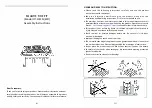
07/03
35035 Rev D
11
STS-42 INSTALLATION INSTRUCTIONS
Figure 8 - Chimney Height
S
T
N
E
N
O
P
M
O
C
Y
E
N
M
I
H
C
F
O
T
H
G
I
E
H
r
e
z
il
i
b
a
t
S
y
e
n
m
i
h
C
1
1
L
S
4
3
/
4
"
s
r
e
c
a
p
S
p
o
t
s
e
ri
F
8
3
5
S
F
0
0
4
5
S
F
0
s
n
r
u
t
e
R
/
s
t
e
s
ff
O
0
3
1
1
L
S
1
½
4
"
g
n
i
h
s
a
l
F
f
o
o
R
0
7
5
F
R
0
1
7
5
F
R
0
*
s
n
o
it
c
e
S
y
e
n
m
i
h
C
6
0
1
1
L
S
4
3
/
4
"
2
1
1
1
L
S
0
1
3
/
4
"
8
1
1
1
L
S
6
1
3
/
4
"
6
3
1
1
L
S
4
3
3
/
4
"
8
4
1
1
L
S
6
4
3
/
4
"
*Dimensions reflect effective height.
Table 2
3. Number of Sections Required
To determine the chimney components needed to
complete your particular installation, follow the steps
below:
a.
Determine the total vertical height of the fireplace
installation. This dimension is measured from the
base of the fireplace assembly to the point where
the smoke exits the termination cap.
b.
Subtract the effective height of the fireplace
assembly from the overall height of the fireplace
installation (measured from the base of the
fireplace to the bottom of the termination cap).
c.
Refer to Table 2 to determine what components
must be selected to complete the fireplace
installation.
d.
Determine the number of firestop spacers, stabi-
lizers, roof flashing, etc. required to complete the
fireplace installation.
2. Chimney Height Requirements (above roof
line)
a.
Major building codes specify a minimum chimney
height above the roof top. These specifications
are summarized in what is known as the
Ten Foot
Rule
. This rule states:
If the horizontal distance from the side of the
chimney to the peak of the roof is ten feet or less,
the top of the chimney must be at least two feet
above the peak of the roof, but never less than
three feet in overall height above the highest point
where it passes through the roof.
If the horizontal distance from the side of the
chimney to the peak of the roof is more than ten
feet, a chimney height reference point is
established on the surface of the roof a distance
of ten feet from the side of the chimney in a
horizontal plane. The top of the chimney must be
at least two feet above this reference point, but
never less than three feet in height above the
highest point where it passes through the roof.
See Figure 8.
b.
These chimney heights are necessary in the
interest of safety but do not ensure smoke-free
operation. Trees, buildings, adjoining roof lines,
adverse wind conditions, etc. may create a need
for a taller chimney should smoking occur.












































